16 Digital Nomad Visas with No Tax [2025]

One of the biggest concerns when applying for a digital nomad visa is the tax implication that comes with it. Fortunately, there are a handful of digital nomad visas with no tax liability for remote workers!
Taxes and digital nomads don’t necessarily mix well.
Since the general rule of thumb is that if you spend 183 days or more in a country, you become a tax resident, digital nomads often get confused as to where they owe taxes because they move around so often. Many only stay in one area for three months at a time!
One way to bypass the tax problem for digital nomads is to apply for digital nomad visas with no tax liability. Digital nomads holding these digital nomad visas with no tax can save hundreds – maybe even thousands – of dollars a year on their taxes.
Now, since taxes are one of the most complicated bureaucratic things in the world, Nomads Embassy highly recommends speaking with an immigration and tax lawyer to help you understand your situation and where you owe taxes – if at all.
We have hand-selected immigration lawyers worldwide to assist our readers with their digital nomad visa applications and determine their tax status. You can always get in touch with them in our individual visa articles (linked in this article) or through our Contact page.
Now, without any further suspense, we’re diving into the digital nomad visas with no tax available right now.

Where do Digital Nomads Pay Taxes?
Paying taxes as a digital nomad is complicated. The number one question is: where do digital nomads pay taxes?
Unfortunately, the answer is not as simple as you may hope. It all depends on the digital nomad’s situation, employment, passport, and where they reside.
For example, digital nomads who are US citizens must pay a citizenship-based tax each year, even if they do not reside in the United States.
Digital nomads who have companies set up may be subject to corporate taxes but can lower their income tax rate depending on where they reside or travel.
As we mentioned before, digital nomads should strongly consider getting in touch with an international tax lawyer or accountant to discuss their situation and find out where they owe taxes.
If this is something you are interested in learning more about, we highly recommend reading The Nomad Capitalist for a deeper look at how being a digital nomad can actually benefit your tax situation.

What is a Digital Nomad Visa?
Before we get into digital nomad visas with no tax, we should first define exactly what a digital nomad visa is.
A digital nomad visa allows remote workers to temporarily reside in a foreign country. Sometimes these visas last for just one year, while others can lead to permanent residency.
Obtaining a digital nomad visa does not allow you to seek local employment. You must already have a sustainable income from working remotely for a company or with clients located abroad.
Digital Nomad Visas with No Tax Liability
Finally, we’ve come to the juicy part of the article – and probably why you even clicked on it. Below are the digital nomad visas with no tax that you can apply for and save hundreds of dollars on income tax.

Antigua and Barbuda
We have another Caribbean nation offering a tax-free digital nomad visa. Antigua and Barbuda requires digital nomad visa applicants to earn at least $50,000 per year working remotely.
It’s also one of the digital nomad visas with an online application, making it quick and easy to apply for. Applicants will receive an answer about their visa in just seven days!
Learn more details about the visa requirements and how to apply for the Antigua and Barbuda digital nomad visa.
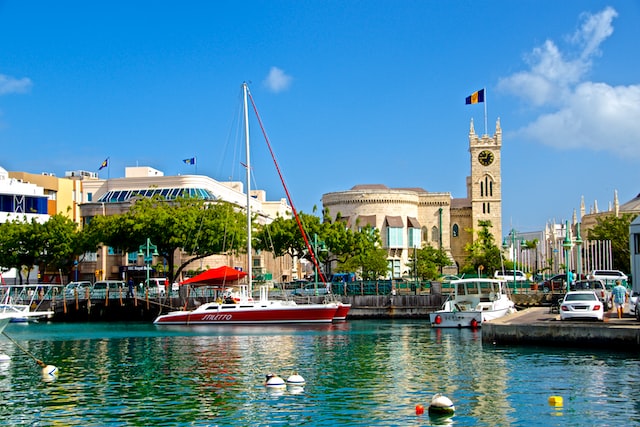
Barbados
The Barbados Welcome Stamp allows remote workers and their families to live on this gorgeous Caribbean island for one year, tax-free.
This is a great opportunity for digital nomads since the minimum income requirement is $50,000 per year. With an online application process, you’ll receive an approval letter in seven business days.
Learn more about the visa requirements and how to apply for the Barbados digital nomad visa.
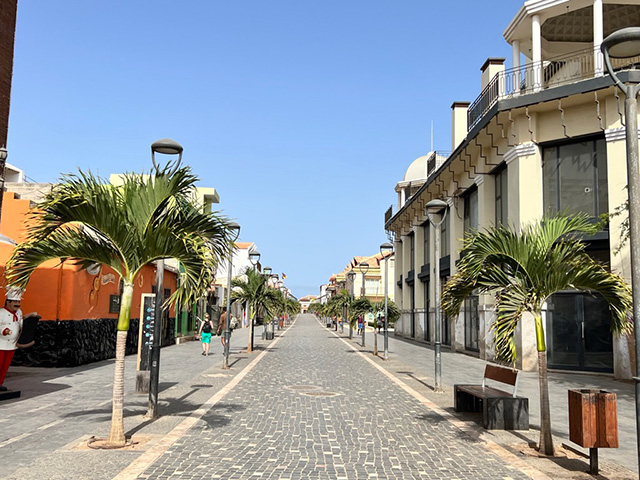
Cape Verde
Made up of ten islands off the west coast of Africa, Cape Verde welcomes remote workers and digital nomads. For six months, you can work remotely from one of these islands while enjoying sandy beaches, delicious cuisine, and gorgeous nature.
To be eligible for this visa, you just have to prove that you maintained a bank balance of at least $1,500 for the last six months. Plus, you won’t owe local taxes!
Learn more about the visa requirements and how to apply for the Cape Verde digital nomad visa.

Costa Rica
Costa Rica has been a long-time favorite destination for digital nomads. With incredible beaches, rainforests, and a friendly culture, remote workers were elated to learn that Costa Rica was implementing a digital nomad visa.
Remote workers must earn at least $3,000 per month to be eligible for this digital nomad visa.
The most beneficial part of this digital nomad visa is that there is no tax liability. Plus, digital nomads can import cars and office supplies tax-free!
Not only are there tax benefits, but digital nomads can open local bank accounts and drive in the country with their original driver’s licenses.
Learn more about the visa requirements and how to apply for the Costa Rica digital nomad visa.

Croatia
Croatia is just one of two digital nomad visas in Europe that do not require digital nomads to pay local taxes.
This could be due to the fact that digital nomad visa holders can only live in the country for one year before they must leave. Unfortunately, the visa is not renewable. However, you can reapply after having been out of the country for at least 90 days.
With a gorgeous Mediterranean coast, unique culture, and gorgeous cities, Croatia is a favorite destination for digital nomads. To be eligible, digital nomads must earn at least €2,540 per month or have €30,420 in savings
Learn more about the visa requirements and how to apply for the Croatia digital nomad visa.
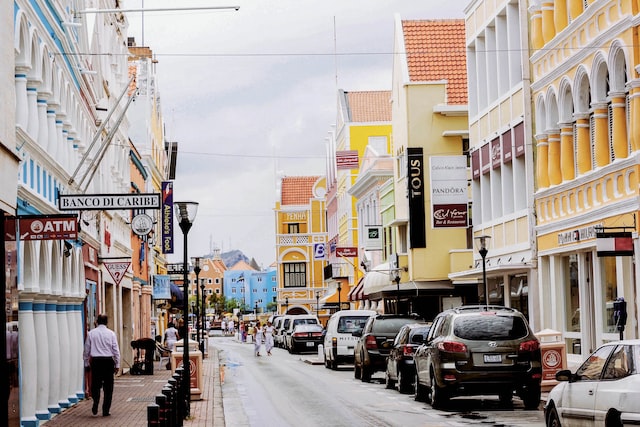
Curacao
The unique Dutch island of Curacao, located in the Caribbean, offers an excellent digital nomad visa with no tax.
With no minimum income requirement, digital nomads just need a clean criminal record, proof of remote work, and a residential address in Curacao to be eligible for the visa.
The application process is done entirely online, and the application fee is a minimal $264 per applicant. You’ll receive an answer in just two weeks.
Learn more about the visa requirements and how to apply for the Curacao digital nomad visa.
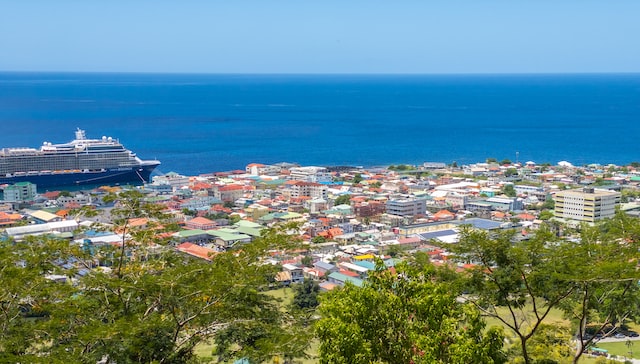
Dominica
The green Caribbean island of Dominica is another digital nomad visa with no tax. Digital nomads can live freely on the island for one year working remotely and earning at least $50,000 per year without worrying about filing their taxes in Dominica.
With an online application, you’ll receive an answer within 28 days of submitting your documents. Applicants may bring their spouses and children with them to live in Dominica for the year too.
Learn more about the visa requirements and how to apply for the Dominica digital nomad visa.

Dubai
It’s fairly well known that Dubai has a 0% income tax for its residents. That’s why you’ll see so many wealthy individuals and companies established there.
Well, it’s no different for its digital nomad visa. As the only digital nomad visa in the Middle East, this is a great opportunity for remote workers looking to live a more elevated lifestyle amongst the rich.
However, to be eligible to apply, you only have to earn $3,500 per month. This was lowered from $5,000 per month in 2022.
Additionally, in 2023, Dubai introduced a new tax law that could be perfect for digital nomads. You’ll just have to stay in the country for three months out of the year if you do not want to apply for the digital nomad visa, to take advantage of the 0% tax rate.
Learn more about the visa requirements and how to apply for the Dubai digital nomad visa.

Ecuador
As of now, Ecuador is the only country in South America that does not require digital nomad visa holders to pay local taxes.
This up-and-coming digital nomad destination is the perfect opportunity for digital nomads who earn at least $1,350 per month and want to save some money on living expenses and taxes throughout the year.
Applicants may also bring their spouses and children to Ecuador with this visa. However, the minimum income requirement will increase with each member.
Learn about the visa requirements and how to apply for the Ecuador digital nomad visa.
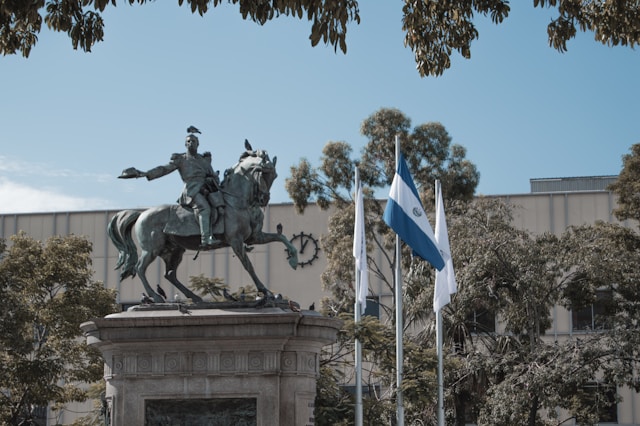
El Salvador
When you apply for the El Salvador digital nomad visa, you will not owe local income tax to the country because they do not tax foreign-earned income, making it an excellent choice for remote workers who want to save!
This digital nomad visa requires applicants to earn at least $1,460 USD per month to qualify. With an affordable cost of living, this means digital nomads could save on everyday living expenses while also saving on income tax.
Applicants may bring a spouse and their minor children, but the minimum income requirement will increase. They can live in El Salvador for a total of four years with the renewable digital nomad visa.
Learn more about the requirements and how to apply for the El Salvador digital nomad visa.

Greece
This may be one of the most exciting digital nomad visas with no tax on our list. Greece offers digital nomads two options. They can stay in Greece for one year with a digital nomad visa, or they can apply for a two-year residence permit.
Now, digital nomads who do not partake in local economic activity, such as purchasing real estate or a car or obtaining a two-year residence permit, are not liable to pay taxes – even if they stay in Greece for more than 183 days out of the year.
There is some conflicting information about taxes in Greece as a digital nomad, but we sat down with our hand-selected local immigration lawyer to discuss the matter. Their interpretation of the law is that digital nomads are not liable to pay local tax if they have the 12-month non-renewable digital nomad visa. If they decide to apply for the two-year residence permit, then they will owe taxes in Greece.
Digital nomads who can enter Greece without an entry visa may apply directly for the residence permit while already in the country. With this residence permit, you could be on a path to permanent residency and even citizenship. However, if this is your goal, you will have to pay taxes in Greece.
Learn more about the visa requirements and how to apply for the Greece digital nomad visa.

Grenada
The lush island of Grenada in the Caribbean also offers a digital nomad visa with no tax to remote workers.
To be eligible to apply for the visa, remote workers must earn at least $37,000 per year. If approved, they can live in Grenada for one year with the option to renew. They can also bring their families with them.
English is also an official language in the country, making it easy and comfortable to navigate the new environment.
Learn more about the visa requirements and how to apply for the Grenada digital nomad visa.

Montserrat
With Montserrat’s Remote Worker Stamp, digital nomads can live and work remotely for up to two years on this gorgeous Caribbean island without paying local taxes.
To be eligible, you must earn at least $70,000 per year and have a clean criminal record. Applicants may also bring their family members with them. Plus, with an online application process, it’s seriously one of the easiest digital nomad visas available.
Learn more about the visa requirements and how to apply for the Montserrat digital nomad visa.

Philippines (Coming Soon!)
The Philippines recently announced it will implement a digital nomad visa allowing remote workers to live in the country for up to two years.
While we are still waiting on the visa requirements, we do know that digital nomad visa holders will not be considered tax residents in the Philippines.
This is excellent news for those tax-savvy remote workers that want to save some money on their hard-earned income.
Learn more about the visa requirements and what we know so far about the Philippines digital nomad visa.

Seychelles
Launched in April 2021, the Seychelles Workcation Retreat Program allows remote workers to come and live on one of 115 gorgeous islands in the Indian Ocean for one year.
During your year here, you will not be liable to pay income tax in Seychelles. There is also no capital gains tax either.
There is no minimum income requirement, but the immigration office may request to see your bank and financial statements to prove that you can support yourself in Seychelles. With an online application process, you’ll receive an answer concerning your application within a few weeks.
Learn more about the visa requirements and how to apply for the Seychelles digital nomad visa.

Uruguay
Arguably one of the easiest digital nomad visas with no tax to obtain, Uruguay allows remote workers to live in the country from six months to one year, with the option to renew.
With no minimum income requirement and an application fee of just $10, we’re surprised more digital nomads aren’t flocking to the safest country in South America to take advantage of this tax-free opportunity.
Uruguay does not tax worldwide income. Therefore digital nomads working remotely for companies abroad will not have to pay income tax while living in Uruguay.
Learn more about the visa requirements and how to apply for the Uruguay digital nomad visa.

Digital Nomad Visas with Reduced Taxes
While not remote workers may want to apply for the digital nomad visas with no tax, they can consider the digital nomad visas with reduced tax rates.

Georgia
Even though Georgia’s digital nomad visa program ended, it does still offer a great opportunity for remote workers. Many countries can stay in Georgia for 365 days visa-free.
There is also a favorable tax rate for residents and for those who open companies in the country. If you don’t want to go through the trouble of applying for a visa but still want reduced tax rates, then Georgia is the best option.

Portugal
Portugal’s digital nomad visa has proven to be extremely popular since becoming available in October 2022. While it is not one of the digital nomad visas with no tax, there is a government program that will reduce personal income tax.
This program is the Non-Habitual Resident Program (NHR) which offers a flat 20% tax or even 0% tax on foreign-earned income. There are further eligibility requirements, and you will have to apply for the NHR program separately, but it is worth it!
The NHR status will last for 10 years. Digital nomads must also stay in Portugal for at least six months out of the year to be considered tax residents as well.
Learn more about the visa requirements and how to apply for the Portugal digital nomad visa, which can lead to the NHR program.
Important Note: Portugal has announced it will end the NHR program on January 1, 2024. For those digital nomads interested in taking advantage of this reduced tax scheme, they should begin their relocation to Portugal before December 31, 2023.

Spain
Spain’s digital nomad visa has a promised tax break that comes along with it.
The laws are still being worked out. However, we understand that there is a tax rate discount for digital nomads. Instead of paying 48%, digital nomads will pay a flat 24% income tax up to €600,000 per year.
Digital nomads who apply for a residence permit to live in Spain for more than a year will have to also apply for a national tax ID number and register as a resident.
Learn more about the visa requirements and how to apply for the Spain digital nomad visa.

Thailand
Another popular destination amongst digital nomads is Thailand. With the Long Term Residence Visa, digital nomads can live in Thailand for a whopping ten years!
However, the eligibility requirements are difficult to fulfill. As an elite and selective visa, there are three categories that you can fit into: wealthy individual, remote worker, or wealthy pensioner.
If you earn $80,000 per year working remotely for a publicly traded company that earns $150 million in revenue for the last three years, you could qualify for the remote worker category.
Otherwise, you must have at least $1 million in assets and invest $500,000 in Thailand to qualify for the wealthy individual category.
Wealthy pensioners must earn $80,000 per year through investments and pensions to qualify.
There is also a tax break with Thailand’s digital nomad visa. Instead of paying a 35% tax rate, digital nomads with this visa will only have to pay 17%.
Learn more about the visa requirements and how to apply for the Thailand digital nomad visa.
Apply for Digital Nomad Visas and Figure Out Your Tax Situation with Nomads Embassy
Are you ready to take full advantage of your remote lifestyle and apply for digital nomad visas with no tax so you can save money each year?
Nomads Embassy is here to connect you with hand-selected immigration lawyers who can assist you with your visa application, relocation, and tax situation.
Simply complete the contact form in the individual visa articles found in the menu at the top of our website to request a call with them today!
You may also enjoy

Do you dream of living and working remotely from Sri Lanka for a year? See if you can with our free Sri Lanka digital nomad visa eligibility check! Simply answer…
by Brittany

Are you planning to apply for the Portugal digital nomad visa? Then you’ll want to read about the new eligibility changes and Portugal digital nomad visa updates for 2026. Each…
by Brittany

Do you dream of living and working remotely from Bulgaria up to two years? See if you can with our free Bulgaria digital nomad visa eligibility check! Simply answer the…
by Brittany
